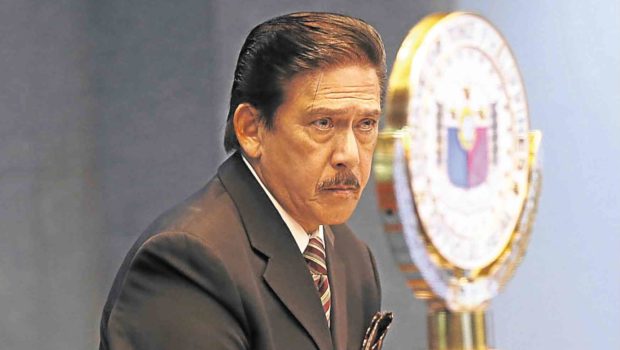House raps vs Diokno stump Senate chief

Credit to Author: besguerra| Date: Mon, 07 Jan 2019 23:21:31 +0000
Why are members of the House of Representatives raising questions about the proposed P3.8-trillion budget for 2019 and leveling charges against Budget Secretary Benjamin Diokno only now, after they have passed the spending bill? Senate President Vicente Sotto III asked on Monday.
House leaders accused Diokno in December last year of “inserting” P75 billion in the 2019 budget of the Department of Public Works and Highways (DPWH) without the knowledge of President Rodrigo Duterte.
According to their allegations, the province of Sorsogon, two of whose officials happen to be Diokno’s in-laws, bagged P10 billion worth of infrastructure projects from the Department of Budget and Management (DBM) in 2018 and stand to get P6 billion worth of projects in 2019.
They also alleged that a construction company incorporated by Diokno’s son-in-law, Romeo Sicat Jr., and Sicat’s stepfather, Casiguran Mayor Jose Edwin Hamor, bagged P551 million worth of government projects in 2018.
Pork discovered
The controversy erupted after Sen. Panfilo Lacson announced in December last year that P2.4 billion in pork had been inserted in the proposed budget for the second district of Pampanga province, whose seat in the House is held by Speaker Gloria Macapagal-Arroyo.
Lacson also reported that P1.9 billion in pork had been given to the first district of Camarines Sur province represented by House Majority Leader Rolando Andaya Jr.
Malacañang demanded an explanation from the House but instead of explaining, the House leadership turned on Diokno and summoned him to Question Hour for grilling on the DPWH budget and contracts.
The House later passed a resolution urging President Duterte to fire Diokno. Malacañang made no move against the budget secretary.
The House passed the spending bill on Nov. 20 and sent it to the Senate on Nov. 22, by which time it was already too late for the senators to approve it before Congress broke up for Christmas.
The delay led to the reenactment of the 2018 budget, also about P3.8 trillion, enabling the government to operate while waiting for a new budget.
The Senate resumes work on the spending bill when it returns next week.
Sotto did not discount the possibility that the issues raised in the House could be tackled during the budget deliberations in the Senate.
Why just now?
“But it surprises me to think why the [congressmen] did not take those issues up when the budget bill was with them,” he said.
The House is investigating the allegations against Diokno, with Andaya himself leading the inquiry.
The budget secretary branded the allegations as “illusory.”
Diokno also said the DPWH’s proposed 2019 budget was increased by P75.5 billion to fulfill a government commitment to spend 5 percent of the gross domestic product on infrastructure.
He said the increased spending on flood control projects in the 2018 budget, which Andaya had also questioned, was the government’s response to climate change.
He said the DBM was not involved in the awarding of contracts or implementation of infrastructure projects.
No scam
The DBM on Monday reiterated that there was no scam in the proposed flood control projects for 2019.
In a statement, the DBM said Andaya’s allegations were “irresponsible and misleading,” as these included supposedly nonexistent flood control projects worth P119 billion in the 2019 spending bill.
“First, the amount representing the proposed allocation for FY (Fiscal Year) 2019 cannot be accounted for yet. There are no existing projects for 2019 as the 2019 budget has yet to be legislated, much less implemented,” the DBM said.
“Second, the amounts allocated in the FY 2017 and 2018 GAA (General Appropriations Act) were reviewed, amended and approved by both houses of Congress before approval of the President,” it added.
The DBM said no district received preferential treatment in the allocation of flood control funds.
“The DBM has no hand in determining the projects that should be implemented and in which areas or districts. This is the job of the implementing agency, in this case the DPWH,” it said. —REPORTS FROM LEILA B. SALAVERRIA AND BEN O. DE VERA